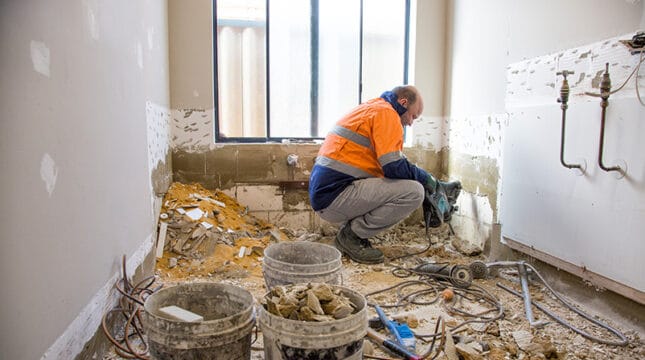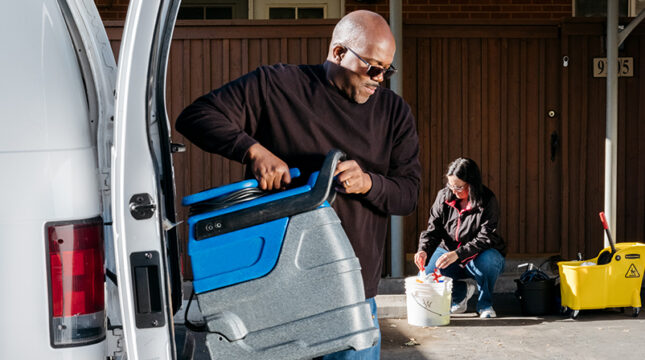How do Commercial Property insurance claims work?
Commercial property insurance is a type of business insurance that can help protect your building, fixtures, equipment, inventory and more. It could also help if you need to make repairs and restock to resume business operations after a catastrophe.
The claims process starts with your policy, the legal agreement you have with your insurer that confirms which business losses are covered and which aren’t. Review this document soon after the incident to see if your loss is protected.
Next, you should file an insurance claim — a formal request for benefits under your policy. Your insurer will confirm the facts of your loss and determine its financial scope.
Here’s how to file your claim:
- Secure the scene to prevent further damage. For example, if pipes are leaking, turn off the water in your building to minimize additional harm.
- Document your loss with photos and written notes. Record names and contact information for everyone involved.
- Contact your insurer or broker to file your claim. Contact information should be on your policy or on the insurance company website. Contact them as quickly as possible to help speed the processing of your claim.
- Notify the authorities if there’s a threat to public safety. For example, if a weather event severely damages your building, ask the fire department to assess whether your premises are safe.
Commercial Property insurance claim examples
Small businesses are vulnerable to risks such as fire, storms, theft, vandalism and more. If you have a covered loss under commercial property insurance, your policy could provide the financial help you need to reopen your doors quickly.
If you have commercial property insurance — or a business owner’s policy (BOP) that combines commercial property coverage with general liability insurance — your policy could help you recover from events like these.
1. Stolen inventory and equipment
Let’s say you own a retail store that gets burglarized overnight. They clean out your inventory. Commercial property insurance could provide coverage for burglary and theft.
If an insurer approves your claim, you could be covered for the value of stolen property and the cost for repairs for breaking-and-entering damage. And if repairs take a while and lead to revenue loss, your policy could also help replace lost business interruption income until you can reopen your business.
2. Plumbing failure and water damage
A pipe suddenly bursts at your fitness studio and causes a backup of water into your treadmills and elliptical machines, causing damage.
Commercial property insurance can help deal with issues like water leaks from plumbing and HVAC systems and appliances. Unlike flood damage, which requires specialized government-backed insurance, commercial property coverage could help with water incidents.
3. Storm damage that destroys structures and business personal property
Wind damage from hurricanes, tornadoes and thunderstorms causes at least $2.5 billion of damage each year. Say a tornado hits your area and causes considerable damage to your restaurant.
Commercial property insurance could help cover the cost of some repairs and replacements. But if you live in a stormy area, a standard commercial property insurance policy might not suffice. To fully protect your business, you may need to add a wind-hail rider or insurance endorsement to your policy.
4. Fire and smoke damage
An electrical fire causes considerable damage to the property at your IT consulting business. Fortunately, insurance can help burned-out businesses rebuild and return to work.
Commercial property insurance can help protect your business assets, including building structures, raw materials, finished goods, store inventory and business equipment against the risks of fire. And your insurance policy could provide financial reimbursement to repair or replace such assets subject to the limits of your policy.
Rebuilding after a major fire can take months. Adding business income interruption coverage to your commercial property insurance could help provide lost income to tide you over until your doors reopen.
Note: Coverage examples are for illustrative purposes only. Your policy documents govern, terms and exclusions apply.
8 tips to file a Commercial Property insurance claim
After you notify your insurance provider of an incident, the insurer will respond with a claim number and the name of your claims adjuster. To help expedite the claims process, prepare to:
- Confirm your insurance coverage. If you’ve never read your commercial property insurance policy, now’s the time. Carefully study the insuring agreement, your coverage limits and policy exclusions. The knowledge you gain will help you present your case effectively and assess the insurer’s proposed settlement.
- Provide your adjuster with a full account of the incident. Share as much information as possible to help the insurer fully assess your claim.
- Provide information about all damaged property, including date of purchase and price. Submitting receipts will help determine the value of your assets.
- Assist the insurer’s field adjuster. They may want to visit your site to inspect a loss. Answer their questions, provide documents and accompany the person during the site inspection.
- Respond to your adjuster’s phone calls or emails. Failing to answer quickly could delay your claim.
- Review the insurer’s claim settlement offer. If you don’t understand how the adjuster derived the settlement amount, ask for details. If you don’t agree with the figure, inquire about the insurer’s claims appeal process and get some additional quotes on repairs. For large claims, it might be worth consulting a public adjuster — an independent professional trained to evaluate insurer settlements.
- If you’re satisfied with the settlement, let the insurer know. They may also recommend cleaning, repair or construction vendors to restore your property.
- If you encounter delays with your claim, let your insurance broker know. They can help troubleshoot hang-ups and put you in touch with people who can help.
How to file a Commercial Property insurance claim with NEXT
- Log in to your NEXT account.
- Let us know about your loss.
- Provide information to one of our claim advocates.
- Work with us to help resolve your claim.
You can file through our web-based customer portal or mobile app for iPhone or Android.






